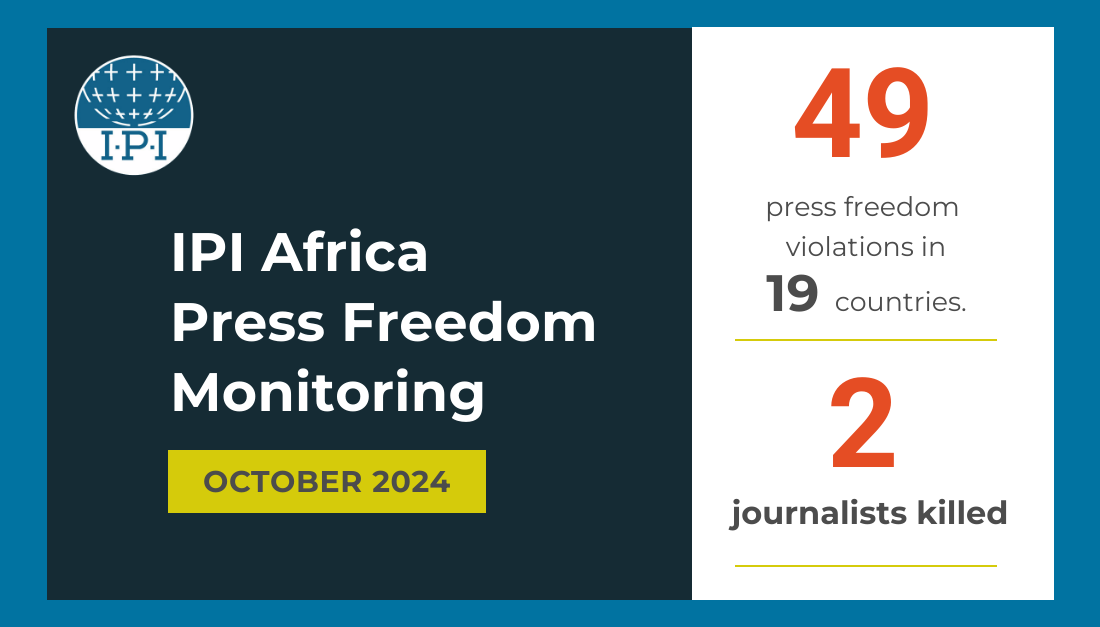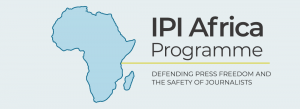In October 2024, IPI’s Africa monitoring program recorded at least 49 incidents of threats to press freedom in 19 countries across sub-Saharan Africa. Physical, verbal, or online attacks (18) was the most frequent category of violations recorded. These attacks included the killings of two journalists in DRC and Somalia. Additionally, IPI recorded 15 incidents of arrest, detention, or charges.State actors remained the main perpetrators (77%), for most of the incidents IPI recorded in October 2024. Mozambique recorded the highest number of press freedom threats and violations, amidst varying attacks on journalists who were covering the post-election protests.
See the factsheet below or download it here.
DOWNLOAD THE FACTSHEET HERE (PDF FILE)
In DRC, on October 29, the rebel group M23, which is active in the conflict-prone area of Mpety in eastern DRC, killed journalist Yoshua Kambere Machozi. He worked for the local community radio station in North Kivu province. The rebels not only killed Machozi but also looted the station, taking away its equipment. Several days later, his body was found along the banks of the Talong River, in an advanced state of decomposition. Barthelemy Bakangana, the director of the radio station, managed to escape during the rebel invasion.
In Somalia, on October 18, Somali-Swedish journalist Amun Abdullahi Mohamed was murdered by two individuals believed to be linked to the Al-Shabab group. Before her killing, she worked with Sweden Radio, exposing Al-Shabab’s recruitment strategies in Rinkeby, Stockholm. Her investigative reporting led to significant backlash and death threats against her. The local press defence group Somali Journalists Syndicate (SJS) condemned her killing and called for an investigation to hold those responsible accountable. To date, the authorities are yet to release any findings regarding her murder or the motives behind it.
In Mozambique, several journalists were assaulted, arrested, and detained by the police in different incidents while reporting on the post-election protests across the country. On 24 October, according to the Media Institute of Southern Africa (MISA), Nuno Gemusse Alberto, a reporter for Rádio Comunitária Monte Gilé, was arrested and severely beaten at a local police station in the province of Zambezia. Two South African journalists, Bongani Siziba and Sbonelo Mkhasibe, and their Mozambican colleague Charles Mangwiro were arrested and detained before being released while reporting in the streets of Maputo. Also, the authorities have restricted access to information online, including imposing internet blackouts several times between October 25 and 31.
In Mauritius, the authorities shut down mobile internet ahead of the country’s national assembly election on November 10. The block was also reported to have been an attempt to to control the free flow of information on social media following an alleged wiretapping scandal wherein recordings of conversations of at least 20 government officials were being circulated online.
In Cameroon, on October 24, gendarmes unlawfully arrested and detained student journalist Guy-Bruno Maimo in Buea, the capital of the Southwest region of Cameroon. He was reporting for the local news outlet, Volcanic Times, during a peaceful protest held by women and detained for five days before being released on October 29, thanks to the mobilization efforts of the local press defense group, the Cameroon Association of English-Speaking Journalists (CAMASEJ), along with support from his family and other news outlets. Reports also indicated that he experienced both physical and psychological ill-treatment while in detention.

